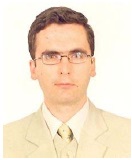| events | executive | news |
The EMBS Chapter of the IEEE Ottawa Section was recognized as the Best Ottawa Chapter in 2008, 2010, 2014, 2019, and 2022 and received the Outstanding Chapter Award from IEEE EMBS in 2011!
Personalized healthcare by control engineering approaches

Associate Professor, Obuda University
July 28, 2016 13:00 - 15:00
Mackenzie Building Room 4359, Carleton University
abstract
Medical devices and computerized medical applications are exponentially increasing nowadays. This is actively supported by the EU's personalized healthcare m-Health and e-Health research programs. The core of such researches is represented undoubtedly by the basic field of biomedical engineering, the physiological modeling, simulation and control topic.
In many biomedical systems external controllers provide biosignal input or inject given specific dosage substituting the internal, physiological procedure because patient's body cannot ensure it or produce it. The outer control might be partially or fully automated. The regulation has several strict requirements, but once adequately established, it permits not only to facilitate the patient's life, but also to optimize (if necessary) the amount of the used dosage.
individualized model-based control gains more and more importance in pathophysiological control. The investigated models are nonlinear and rather complex by nature. Furthermore, the parameters of the patients slowly change over time. However, despite the difficulties, the controllers have to ensure safety and stability under all circumstances. Hence, not only classical nominal control requirements, i.e. disturbance rejection, good command following and stability are required, but robust performance as well. Modern robust control methods endeavor to provide this safety, and guarantee to handle even the worst case scenario by taking neglected dynamics into account. This is done by exact mathematical formulations, but also by empiricism gained from the medical expertise of the corresponding control process. Although modern robust control theory represent linear control methods, their extension into nonlinear cases is an actively researched case as well.
The topic of the presentation will focus on this methodology, i.e. modern robust control methods, in the context of the Physiological Controls Group of the Obuda University established in 2013 to integrate in a structural form the university researches in this sense. The presentation gives an overview of the obtained results focusing on diabetes, tumor and hemodialysis, but presenting biostatistical approaches as well. The results are presented from the perspective of the recently rewarded ERC StG grant of the EU
biography
Dr. habil. Levente Kovács received his MSc degrees in electrical engineering in 2000 ("Politehnica" University of Timisoara, Romania) and biomedical engineering in 2010 (Budapest University of Technology and Economics, Hungary). He received his PhD from the Budapest University of Technology and Economics in 2008. His fields of interest are modern control theory and physiological controls - within these subjects, he has published more than 220 articles in international journals and refereed international conference papers, accumulating an impact factor over 20 and h-index 12. Currently, he is an associate professor at Obuda University, where he defended his habilitation with merit in 2013. He is the vice dean for education of the John von Neumann Faculty of Informatics and head of the Physiological Controls Research Center. He was János Bolyai Research Fellow of the Hungarian Academy of Sciences (HAS) between 2012-2015 finalizing the research program with HAS merit as well.
He has been an IEEE member since 2009, also an IEEE EMBS and IEEE SMC Society member from 2012 and IEEE CSS Society member from 2013. At IEEE Hungary Section level Dr. Kovács is Membership Development Officer from 2010, while from 2013, he is the elected vice-chair of the IEEE Hungary Section. Currently he is president elect of the IEEE Hungary Section. Since 2015 he has been the elected the chair of the IEEE SMC Hungary Chapter. He is member of the IFAC TC 8.2 "Biological and Medical Systems" form 2010, and member of the Hungarian Diabetes Association from 2010 as well.
Dr. Kovács is a recipient of the highly prestigious ERC StG grant of the European Union.
Last updated July 22, 2016


